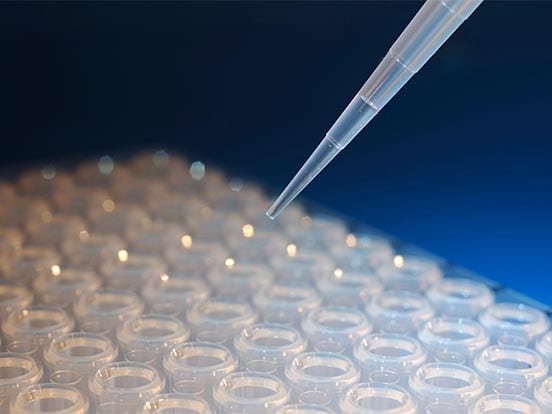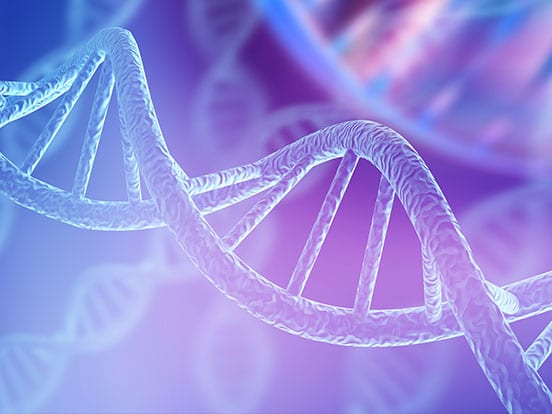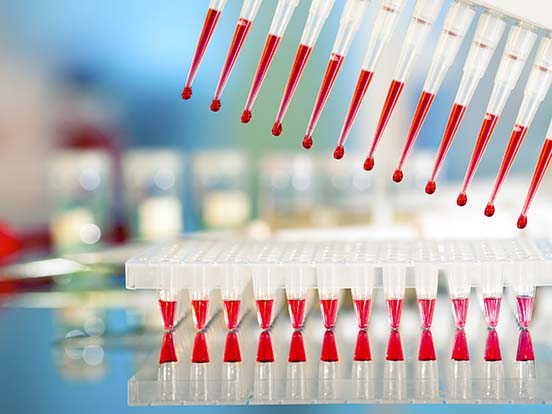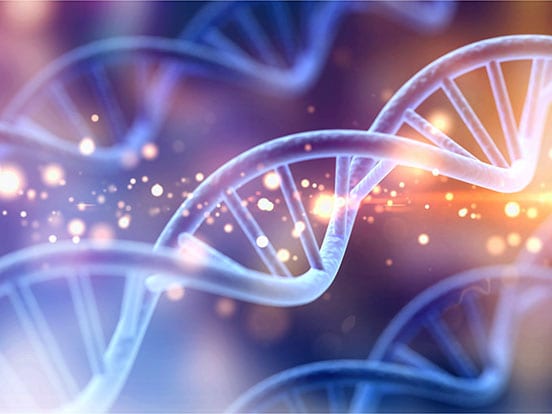
cfPure® Cell Free DNA Extraction Kit
Rapid and efficient purification of circulating cell free DNA
AMSBIO offers cfPure® Cell Free DNA Extraction Kit for scalable and automation-friendly isolation of circulating cell-free DNA (cfDNA) from patient serum or plasma samples. These kits utilize silica-coated paramagnetic particles to purify cell free DNA (cfDNA) from less than 1mL to greater than 10mL of serum or plasma.
The buffers were developed to ensure efficient recovery of 100bp-500bp DNA fragments in order to maximize recovery of cell-free DNA. The recovered DNA is suitable for a wide range of downstream applications, such as bisulfite sequencing, NGS, and qPCR.
Features
- Enables the user to scale the protocol for use with any sample volume from 100 µl to 10 mL
- Can be utilized in single tubes or 24 to 96-well plates
- Elution volumes range from 15µL to 50µL
- High purity and reproducibility: extracted cfDNA is suitable for NGS, qPCR and other demanding applications
Benefits
- Time efficient: manual extraction protocol takes less than 75 minutes
- Automation-friendly
- Cost-effective
- Optimized protocol gives highly reproducible results
- Higher yields relative to other magnetic bead-based methods
| Name | Datasheet | Packsize | Order |
|---|---|---|---|
| cfPure® Cell Free DNA Extraction Kit- 100 ml | 1 kit | View | |
| cfPure® Cell Free DNA Extraction Kit- 250 ml | 1 kit | View | |
| cfPure® MAX Cell-Free DNA Extraction Kit | 1 kit | View | |
| cfPure® MAX V2 Cell-Free DNA Extraction Kit | 1 kit | View | |
| cfPure® V2 Cell Free DNA Extraction Kit- 100 ml | 1 kit | View | |
| cfPure® V2 Cell Free DNA Extraction Kit- 250 ml | 1 kit | View |
Applications
Reproducible & efficient recovery of cfDNA
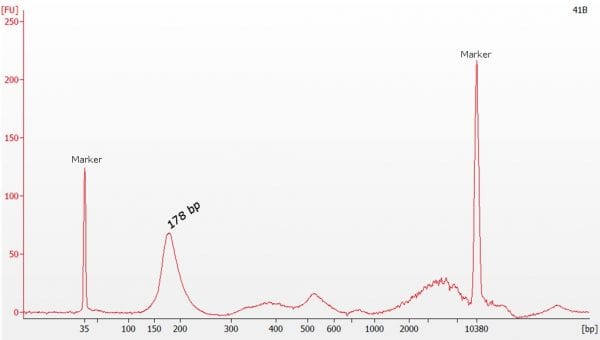
To assess reproducibility, DNA was extracted from 1mL of plasma from 4 different human donors in duplicate using the cfPure® cell free DNA extraction kit
| Plasma ID | Total DNA recovered (ng) |
|---|---|
| A | 7.00 |
| A | 7.05 |
| B | 32.45 |
| B | 33.50 |
| C | 26.80 |
| C | 27.70 |
| D | 10.90 |
| D | 10.90 |
Superior recovery of cfDNA compared to competitors
cfDNA was purified from 2mL of plasma from 3 different donors by either the cfPure® Cell Free DNA Extraction Kit or by a competitor’s magnetic bead-based cell free DNA extraction kit. DNA recovery was assessed either by a fluorescent method or by qPCR using primers complimentary to ALU sequence DNA.
| Extraction Kit | Sample ID | cfDNA recovered per ml of plasma(ng) | 115 ALU sequence cfDNA per ml of plasma (ng) (by PCR) |
|---|---|---|---|
| Competitor T | 1 | 4.99 | 1.97 |
| cfPure® | 1 | 6.35 | 2.53 |
| Competitor T | 2 | 6.18 | 3.21 |
| cfPure® | 2 | 8.28 | 3.93 |
| Competitor T | 3 | 6.93 | 3.79 |
| cfPure® | 3 | 7.50 | 3.87 |
Importance of cfDNA
Circulating cfDNA is normally comprised of DNA fragments from healthy cells. However, apoptotic cells, necrotic cells, cancer cells, and intact cells all release cfDNA into the bloodstream.
Recently, DNA shed from tumor cells has been identified as a non-invasive method of screening biomarkers for the early diagnosis and prognosis of cancer. This method, sometimes called "liquid biopsy", can provide guidance for treatment decisions, and can enable monitoring of cancer therapy, and organism-wide screening for the presence of nascent metastatic tumors in drug-treated cancer patients.
Circulating cfDNA is easily collected by standard, minimally invasive, blood draws. Compared with sampling of DNA from FFPE tumor specimens, cfDNA can provide superior real-time data on primary and metastatic tumors, and offers the potential to analyze biomarkers for mutational information.
In addition, fetal cfDNA can be isolated from peripheral maternal blood and can be used for fetal sex determination and prenatal diagnosis of chromosomal aneuploidy and many other genetic disorders.
